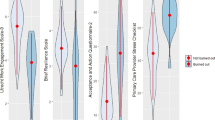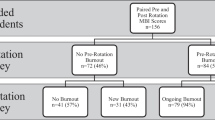Abstract
Background
Assessing resident well-being is becoming increasingly important from a programmatic standpoint. Two measures that have been used to assess this are the Clance Impostor Scale (CIS) and the Maslach Burnout Inventory-Human Services Survey (MBI-HSS). However, little is known about the relationship between the two phenomena.
Objectives
To explore the prevalence and association between impostorism and burnout syndrome in a sample of internal medicine residents.
Design
Anonymous, cross-sectional postal survey.
Participants
Forty-eight internal medicine residents (postgraduate year [PGY] 1–3) at the Schulich School of Medicine & Dentistry (62.3% response rate).
Measurements and Main Results
Short demographic questionnaire, CIS and MBI-HSS. Impostorism and burnout syndrome were identified in 43.8% and 12.5% of residents, respectively. With the exception of a negative correlation between CIS scores and the MBI’s personal accomplishment subscale (r = −.30; 95% CI −.54 to −.02), no other significant relations were identified. Foreign-trained residents were more likely to score as impostors (odds ratio [OR] 10.7; 95% CI 1.2 to 98.2) while senior residents were more likely to experience burnout syndrome (OR 16.5 95% CI 1.6 to 168.5).
Conclusions
Both impostorism and burnout syndrome appear to be threats to resident well-being in our program. The lack of relationship between the two would suggest that programs and researchers wishing to address the issue of resident distress should consider using both measures. The finding that foreign-trained residents appear to be more susceptible to impostorism warrants further study.
Similar content being viewed by others
References
Accreditation Council of Graduate Medical Education. Resident duty hours. http://www.acgme.org/DutyHours/dutyHrs_Index.asp.
Gopal R, Glasheen JJ, Miyoshi TJ, Prochazka AV. Burnout and internal medicine resident work-hour restrictions. Arch Intern Med. 2005;165(22):2595–600.
Clance P, Imes SA. The impostor phenomenon in high achieving women: dynamics and therapeutic intervention. Psychotherapy (Chic Ill). 1978;15(3):241–7.
Langford J, Clance P. The impostor phenomenon: recent research findings regarding dynamics, personality and family patterns and their implications for treatment. Psychotherapy. 1993;30:495–501.
September AN, McCarrey M, Baranowsky A, Parent C, Schindler D. The relation between well-being, impostor feelings, and gender role orientation among Canadian university students. J Soc Psychol. 2001;141(2):218–32.
Clance PR. The Impostor Phenomenon: When Success Makes You Feel Like a Fake. New York: Bantam Books.
King JE, Cooley EL. Achievement orientation and the impostor phenomenon among college students. Contemp Educ Psychol. 1995;20(3):304–12.
Sonnak C, Towell T. The impostor phenomenon in British university students: relationships between self-esteem, mental health, parental rearing style and socioeconomic status. Pers Individ Differ. 2001;31(6):863–74.
Sightler KW, Wilson MG. Correlates of the impostor phenomenon among undergraduate entrepreneurs. Psychol Rep. 2001;88(3):679–89.
Henning K, Ey S, Shaw D. Perfectionism, the imposter phenomenon and psychological adjustment in medical, dental, nursing and pharmacy students. Med Educ. 1998;32(5):456–64.
Oriel K, Plane MB, Mundt M. Family medicine residents and the impostor phenomenon. Fam Med. 2004;36(4):248–52.
Maslach C. Burnout: a Multidimensional Perspective. In: Schaufeli WB, Maslach C, Marek T, eds. Professional Burnout: Recent Developments in Theory and Research. Washington DC: Taylor & Francis; 1993:19–32.
Maslach C, Schaufeli WB, Leiter MP. Job burnout. Annu Rev Psychol. 2001;52:397–422.
Shanafelt TD, Bradley KA, Wipf JE, Back AL. Burnout and self-reported patient care in an internal medicine residency program. Ann Intern Med. 2002;136(5):358–67.
Panagopoulou E, Montgomery A, Benos A. Burnout in internal medicine physicians: differences between residents and specialists. Eur J Intern Med. 2006;17(3):195–200.
Martini S, Arfken CL, Churchill A, Balon R. Burnout comparison among residents in different medical specialties. Acad Psychiatry. 2004;28(3):240–2.
Golub JS, Weiss PS, Ramesh AK, Ossoff RH, Johns MM 3rd. Burnout in residents of otolaryngology-head and neck surgery: a national inquiry into the health of residency training. Acad Med. 2007;82(6):596–601.
Biaggi P, Peter S, Ulich E. Stressors, emotional exhaustion and aversion to patients in residents and chief residents—what can be done? Swiss Med Wkly. 2003;133(23–24):339–46.
Sargent MC, Sotile W, Sotile MO, Rubash H, Barrack RL. Stress and coping among orthopaedic surgery residents and faculty. J Bone Joint Surg Am. 2004;86-A(7):1579–86.
Collier VU, McCue JD, Markus A, Smith L. Stress in medical residency: status quo after a decade of reform? Ann Intern Med. 2002;136(5):384–90.
Bellini LM, Baime M, Shea JA. Variation of mood and empathy during internship. JAMA. 2002;287(23):3143–6.
Eron LD. Effect of medical education on medical students’ attitudes. J Med Educ. 1955;30:559–66.
Chae J, Piedmont R, Estadt B, Wicks R. Personological evaluation of Clance’s impostor phenomenon scale in Korean sample. J Pers Assess. 1995;65(3):486.
Maslach C, Jackson SE, Leiter MP. Maslach Burnout Inventory Manual. 3Mountain View, California: CPP; 1996.
Kuczkowski KM. International medical school graduates in American medicine: is there the “dark side of the moon”? Acta Obstet Gynecol Scand. 2004;83(12):1228–9.
Fiscella K, Roman-Diaz M, Lue BH, Botelho R, Frankel R. “Being a foreigner, I may be punished if I make a small mistake”: Assessing transcultural experiences in caring for patients. Fam Pract. 1997;14(2):112–6.
Bates J, Andrew R. Untangling the roots of some IMG's poor academic performance. Acad Med. 2001;76(1):43–6.
Prins JT, Gazendam-Donofrio SM, Tubben BJ, van der Heijden FM, van de Wiel HB, Hoekstra-Weebers JE. Burnout in medical residents: a review. Med Educ. 2007;41(8):788–800.
Leiter MP, Maslach C. The impact of interpersonal environment on burnout and organizational commitment. J Org Behav. 1988;9(4):297–308.
Leiter MP. Coping patterns as predictors of burnout: the function of control and escapist coping patterns. J Org Behav. 1991;12(2):123–144.
Acknowledgments
The authors express gratitude to those who participated in this study. We also would like to thank the Department of Medicine’s Education Office for managing the study’s mailings.
Conflict of Interest
The authors declare no conflict of interest with regards to this study.
Author information
Authors and Affiliations
Corresponding author
Rights and permissions
About this article
Cite this article
Legassie, J., Zibrowski, E.M. & Goldszmidt, M.A. Measuring Resident Well-Being: Impostorism and Burnout Syndrome in Residency. J GEN INTERN MED 23, 1090–1094 (2008). https://doi.org/10.1007/s11606-008-0536-x
Published:
Issue Date:
DOI: https://doi.org/10.1007/s11606-008-0536-x




